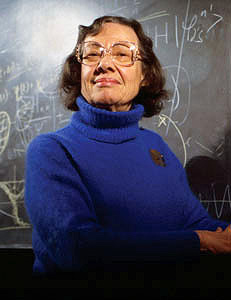On Oct. 15, President Barack Obama named 10 prominent researchers as recipients of the National Medal of Science. UR Research Professor in the department of chemistry Esther Conwell was one of them.
Conwell, also a professor in the department of physics, is the first UR faculty member to receive this award. It is the highest honor bestowed by the United States Government on scientists, engineers and inventors.
Conwell greatly contributed to the computer revolution by explaining how electrons travel through semiconductors. Her research earned her membership in both the National Academy of Sciences and the National Academy of Engineering.
“When I was starting as a professional physicist, it was shortly before the transistor was invented,” Conwell said. “The communications revolution that resulted from the invention of the transistor and the integrated circuit were based on using semiconductors, so there was important research to be done and many people were doing it.”
Even half a century later, Conwell’s scientific breakthrough work on semiconductors is still important to the understanding of electron transport today.
Equally notable is Conwell’s contribution to the female community of scientists. She is considered a pioneer in creating opportunities for women in science classrooms and professional laboratories.
“[Working in a male-dominated field] didn’t deter me, but I did not get equal treatment and I had to accept the treatment I got if I wanted to work in that field,” Conwell said.
Conwell was once denied the position of Assistant Engineer because of her gender — she took the job of engineer’s assistant instead, which significantly lowered her pay.
“It took a long time, but, more recently, it is changing,” Conwell said. “It is a much better situation for women now.”
Having worked in the chemistry department of the Xerox Corporation for 27 years, Conwell cites the fact that there are now two tenured women as evidence that the culture is changing.
UR President Joel Seligman points out the importance of Conwell’s story to women in other fields as well.
“Conwell’s experience shows that women have had to overcome substantial obstacles in the past,” Seligman said. “Her story encourages other women to follow their passions in their chosen fields, whether in science or other disciplines.”
Named as one of the 50 most important women in science by Discover Magazine in 2002, Conwell continues to motivate female scientists everywhere.
“They’re going to have to work harder than a man to get to the same place,” Conwell said. “So if you’re prepared to work hard and not be discouraged, I think [science is] a good career for women.”
Conwell blames the unequal treatment of women in this field on the stereotypical perception of society, which sees women doing different jobs than men.
Today, however, there is a growing trend of women enrolling in science programs, particularly biology.
“There are a lot of women with good jobs at universities, doing research in biology,” Conwell said. “They seem to be treated better when there are more of them.”
Seligman sees Conwell’s success as a way to encourage the UR community to remove any remaining obstacles to full participation by women in research and education.
“The President is interested in having more women and more qualified women, so that’s a good thing,” Conwell said. “I don’t think that the numbers in the faculty has changed greatly, but UR is trying.”
Conwell will be receiving the award at a White House ceremony in November.
Lim is a member of the class of 2014.





